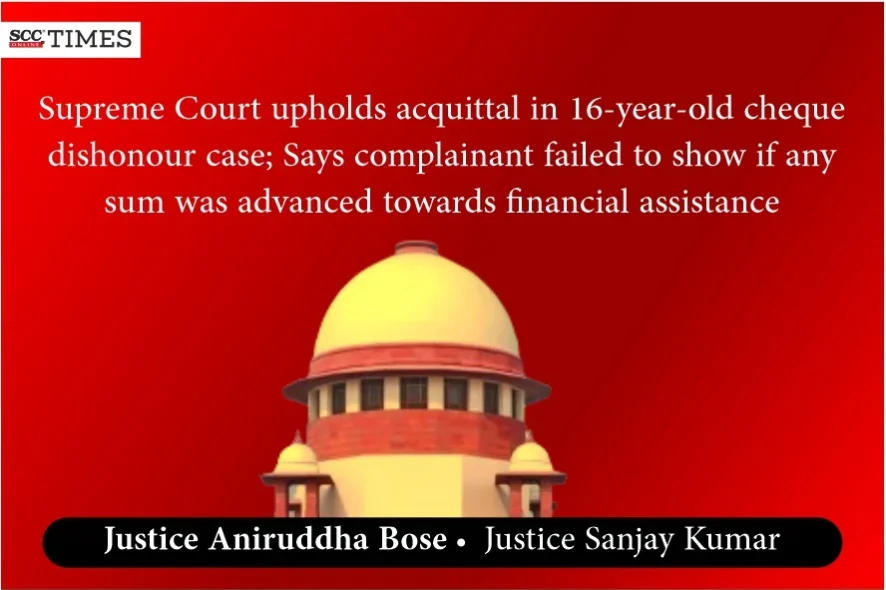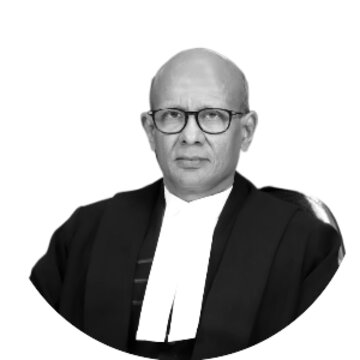Supreme Court: In four petitions for special leave to appeal filed by a partnership firm (‘Rajco Steel Enterprises’) dealing in iron and steel products, against a Judgment of Calcutta High Court, wherein the Court dismissed Rajco Steel Enterprises appeal against acquittal of the accused/ respondent 1 for offences under Section 138 of the Negotiable Instrument Act, 1881 (‘NI Act’), the division bench of Aniruddha Bose* and Sanjay Kumar, JJ. has opined that there is no perversity in the finding of the High Court, and prior to that, in the finding of the First Appellate Court, that went against Rajco Steel, and these findings are not perverse or based on no evidence.
The petitioner, through its partner, had lodged four complaint cases under the aforesaid provision, after four cheques, alleged to have been issued by the accused, were dishonoured on the ground of insufficiency of funds. The petitioner claims that these cheques were issued between 07-11-2008 and 24-11-2008, drawn on the Axis Bank Limited in Kolkata. The defence case, in essence, was that the dishonoured cheques were neither issued nor handed over to Rajco Steel, but these were illegally procured by the Rajco Steel from the custody of the investigating agency i.e., CBI and were subsequently presented for encashment intentionally. The main case of the accused thus, was that there was no debt as such because the cheques were never issued in the first place.
The Trial Court held that the impugned cheques were not part of the cheque book seized by CBI and these were issued in discharge of a legally enforceable debt. Thus, the accused was convicted by the Trial Court for commission of offence under Section 138 of the NI Act, as she had failed to rebut the presumption contained in Section 118 read with Section 139 of the NI Act.
The First Appellate Court set aside this finding and acquitted the accused. It found that the Rajco Steel had failed to produce any document showing any loan transaction. There was no proof of any loan transaction and the Rajco Steel had also failed to prove handing over the cheques to it by the accused. The First Appellate Court also took note of the fact that the signature of the accused and the figures showing the amount in the respective cheques were in different inks and held that the accused had successfully rebutted the presumption of guilt contained in aforesaid Sections of the NI Act.
The petitioner’s appeal before the High Court against the judgment of acquittal was also dismissed. The High Court found that no valid documentary evidence could be produced by Rajco steel and the prosecution, for substantiating the existence of any enforceable debt or other liability on the part of the accused.
The Court noted that the question involved in this proceeding is as to whether the cheques were issued in discharge of a debt and if it was so, then whether the accused was able to rebut the presumption in terms of Section 118 read with Section 139 of the 1881 Act. However, after referring to Narendra Pratap Narain Singh v. State of U.P., (1991) 2 SCC 623, wherein it was said that the jurisdiction of this Court under Article 136 of the Constitution of India to interfere with concurrent findings of fact is not in question, when such findings are based on no evidence or are perverse. Thus, the Bench said that the question, it has to address is as to whether the findings of the First Appellate Court and the High Court are on no evidence or perverse.
The Court said that both the Courts have examined the evidence threadbare and against Rajco Steel.
Concerning the question as to whether the sum involved in the cheques was advanced in discharge of a legally enforceable debt or not, the Court said that Rajco Steel has failed to show if any sum was advanced towards financial assistance. Further, it said that both the appellate fora, on-going through the evidence did not find existence of any “enforceable debt or other liability”. This strikes at the root of the Rajco Steel’s case.
Thus, the Court opined that there is no perversity in the finding of the High Court, and prior to that, in the finding of the First Appellate Court, that went against Rajco Steel, and these findings are not perverse or based on no evidence.
CASE DETAILS
|
Citation: Appellants : Respondents : |
Advocates who appeared in this case For Petitioner(s): For Respondent(s): |
CORAM :









